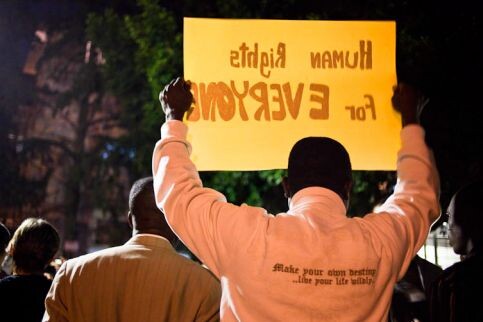The Electronic Intifada 17 December 2010

Immigrants protest for human rights in Tel Aviv. (Eduardo Soteras/ActiveStills)
CAIRO (IPS) - After building a wall in the occupied West Bank, including East Jerusalem, Israel has begun construction on a new wall, this one to keep migrants from Africa out. The new wall is coming up on the Egyptian border, and with Egyptian support.
The Israeli government approved plans late last month to build a detention camp near its border with Egypt to house illegal African immigrants. Local activists decried the move, which they say flies in the face of internationally-accepted human rights norms.
“The idea of a prison built expressly for African immigrants is not only racist, it also contravenes basic tenets of international law,” Hafez Abu Saeda, president of the Cairo-based Egyptian Organization for Human Rights told IPS.
On 28 November, Israel’s cabinet approved construction of a camp to temporarily accommodate undocumented African immigrants that enter Israel from neighboring Egypt. According to Israeli Prime Minister Benjamin Netanyahu, who provided little else by way of detail, the project comes within the context of a wider plan to halt the “wave of illegal immigrants” entering the country in search of employment.
Israel claims that within recent years tens of thousands of African migrants have illicitly crossed the Egypt-Israel border into its territory. Once inside the country, these migrants are often hired as manual laborers — at relatively low wages — by Israeli farms and in illegal settlements in the occupied West Bank.
This influx, Netanyahu was quoted as saying, “is growing and it threatens the jobs of Israelis. It is changing the face of the state and we have to stop it.”
The Egypt-Israel border represents a major transit route for African migrants, both political refugees and job seekers, coming mainly from Sudan, Ethiopia and Eritrea. Attempts to illegally cross the frontier — already tense due to its proximity with the besieged Gaza Strip — often result in fatal clashes with Egyptian border police.
In late October, a Sudanese national was killed by Egyptian border authorities while attempting to cross into Israel. A recent report by Human Rights Watch noted that since 2007 Egyptian border authorities have killed at least 85 African migrants, recording 24 fatalities this year and 19 the year before.
The Israeli prime minister, for his part, stressed that the planned detention center was intended to house illegal job seekers and not political refugees.
“We are not stopping the entry of war refugees,” he was quoted as saying. “But we have to stop the mass entry of illegal work seekers due to the severe impact they can have on the nature and future of the State of Israel.”
Abu Saeda, however, challenged Israel’s right to make the distinction.
“The issue of who is and who isn’t a political refugee should be decided by the UN High Commission for Refugees (UNHCR), which is mandated with determining if migrants’ lives are in jeopardy in their home countries,” he said.
Abu Saeda also refuted Israeli claims that African immigrants represented an economic liability.
“Israel welcomes the Falasha [Ethiopian Jews] as well as Jews from other countries, such as Russia, even going so far as to offer financial incentives to Jewish immigrants,” he said. “So how can they say immigrants are bad for their economy?”
The last week of November saw Israel begin construction of a 250-kilometer long electric fence along its border with Egypt. Israeli officials say the $360 million fence, which will incorporate high-tech surveillance cameras, aims to stop the influx of African migrants.
A 1979 peace treaty between Egypt and Israel strictly limits military and security deployments — by either side — on or near the shared border. Nevertheless, Egyptian officialdom appeared indifferent to news of Israel’s planned border fence.
Egyptian Foreign Ministry spokesman Hossam Zaki has said that Egypt neither approved nor disapproved of the barrier “as long as it is built on Israeli territory.” He went on to describe the project as “an internal Israeli affair” that neither threatened Egypt’s national interests nor violated its sovereignty.
The planned fence will not be the only barricade to go up in the fraught border zone.
Over the last year, Egypt has been building an underground steel barrier along its 14-kilometer border with the Gaza Strip with the ostensible aim of disrupting smuggling operations. Since Israel — and later Egypt — hermetically sealed its boundary with the Strip in 2007, Gaza’s roughly 1.5 million inhabitants have come to rely on cross-border tunnels for their most basic needs.
“The frontier zone is becoming a region of walls and fences,” Ayman Abdelaziz Salaama, international law professor at Cairo University, told IPS. “For the last ten years, Israel — ever obsessed with its own security — has surrounded itself with walls and fortifications.
“But no country in history has been able to build walls high enough to keep out those determined to get in,” he added.
Abu Saeda agreed, noting that no amount of border security could ever entirely deter attempts at emigration as long as certain countries continued to suffer chronic economic stagnation.
“Instead of building camps and fences, the international community should promote development in these countries so as to alleviate the root causes of undocumented migration, namely, unemployment and poverty,” he said.
A conversation with one undocumented Darfurian migrant resident in Cairo, arrested earlier this year for attempting to cross the border illegally, appeared to bear this out.
“My cousins snuck into Israel and found jobs with relatively good salaries, some of which they sent back to Darfur,” he told IPS on condition of anonymity. “Even though I was jailed for thirty days for attempting it myself, I’m thinking about trying my luck at the border again.”
He added: “Because the situation in Darfur won’t improve any time soon.”
All rights reserved, IPS - Inter Press Service (2010). Total or partial publication, retransmission or sale forbidden.


